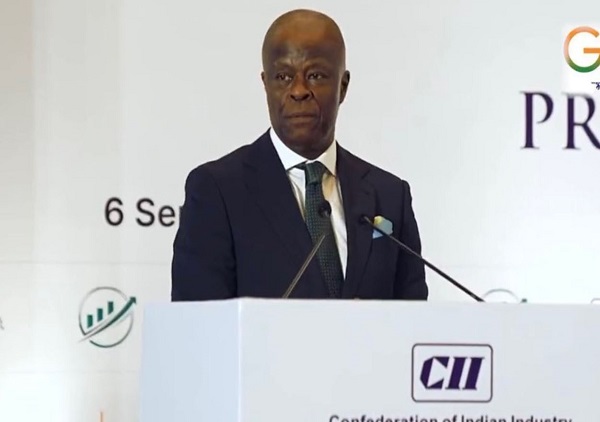The Federal Government is in the process of removing major macro-economic impediments to the stability of the foreign exchange (forex) rate, inflation, interest rates, liquidity and access to adequate finance.
In a new acceleration of President Bola Tinubu’s monetary and fiscal reforms, the government is also finalizing key initiatives aimed at freeing the macro-economic environment from legacy constraints, with a view to enhancing Nigeria’s attractiveness as a global destination for investments.
Tinubu had launched major fiscal and monetary reforms, including the abolition of multiple forex rates, removal of forex restrictions and streamlining investment approval process.
Minister of Finance and Coordinating Minister of the Economy, Mr. Wale Edun, said the process for the removal of identified obstacles to a stable and liquid macro-economic environment was almost being completed.
“The major macro-economic impediments to the stability of the exchange rate, of inflation, of interest rates and indeed of obstacles to liquidity, to enough financing, are now in the process of being removed,” Edun said.
The pronouncement came as the naira recorded its largest gain at the forex market, closing at N722 per dollar, the strongest rate since June 2023 when the Central Bank of Nigeria (CBN) unified multiple exchange rates.
Speaking on the sidelines of the Group 20 (G20) Summit in India yesterday, the minister expressed Nigeria’s perspective and commitment to building a stronger, sustainable, and resilient economy.
He pointed out that while government had taken steps to improve the business environment through the removal of forex restrictions and streamlining of the investment approval process, it would soon deepen the reforms with another round of comprehensive initiatives to stabilise the macro-economic outlook.
“Our focus is on attracting global capital, promoting foreign direct investments and this underscores our commitment to job creation, economic diversification, and revenue expansion,” Edun added.
He urged investors to take advantage of the opportunities that Nigeria had offered, stressing that Nigeria was an attractive destination for business, brimming with opportunities across the various sectors.
Edun said government’s reforms would also drive inclusivity by including women and young people in what was going on in the economy and having them play their role.
“For those interested in investing, the playing field has been levelled, it has been cleared of debris and the opportunity is now there for you to seize,” Edun told Indian and other global investors.
The naira recovery has been attributed to announcement by the CBN Acting Governor, Folashodun Shonubi that forex backlogs will be cleared in two weeks.
The uptick in crude oil prices have also helped naira recovery at the official market.
Oil prices hit a 10-month high owing to supply cuts by Russia and Saudi Arabia with Brent crude price rising to $91pb for the first time since November 2022.
Managing Director, Financial Derivatives Company Limited, Bismarck Rewane, said Saudi Arabia would further extend supply cuts to December, adding that Brent prices were expected to rise to $95pb by year end.
Rewane added that global crude oil supplies were expected to improve on refinery maintenance.
On forex backlog clearance, Shonubi had last Monday said that the apex bank was working with commercial banks to clear the forex backlog through different structures within the forex market.
Shonubi said the banks, which controls 75 per cent of the forex transactions would play significant role in seeing that the backlogs go.
The backlogs, estimated at $8 billion to $10 billion, constitute of dollar requests from manufacturers who wanted to purchase raw material inputs from abroad, parents paying their children’s tuition fees abroad, Nigerians paying medical bills abroad, travelers sourcing Business Travel Allowances (BTAs), and Personal Travel Allowances (PTA), among others.
Analysis of data on the FMDQ website showed a $160 million transaction volume on Friday, a major leap from around $60 to $80 million average daily turnover recorded previously.
However, at the informal parallel market, naira closed weekend around N920 per dollar amid concerns the supply gap may linger.
Former Executive Director, Keystone Bank Limited, Richard Obire said the weakness of the naira over time had been caused by two broad issues linked to the quality of leadership and governance.
He said Nigeria’s heavy and skewed outward-oriented consumption of goods and services as seen in decades of long substantial bills for food and energy imports remained a hindrance to naira stability.
Also, the massive corruption-driven capital outflows which in turn severely damaged Nigeria’s capacity to produce at scale that would enable the country to fully engage its large population to create widespread prosperity worked against the naira.
On ways to strengthen the naira, he advised that in the short-term, there was need to find non-market damaging ways to increase the supply of hard currencies and reducing the demand for same.
According to him, right pricing for remittances and frictionless processes for their use by recipients should see the volumes growing again.
He said that insecurity hampering food production needed to be tackled with a sense of urgency and effectiveness.
“Priority should be given through deploying pragmatyic incentive programmes to drive up the volume of food products for domestic consumption and industrial use to reduce our food import bill.
“All government consumption expenditures requiring the use of hard currencies should be suspended indefinitely, starting now,” Obire said.
Obire added that the Turn Around Maintenance (TAM) status of refineries in Port Harcourt and Warri should be appraised immediately.
He said: ”Efforts should be focused on the one which can begin producing quicker. The other one should be made to be up and running, not long after. This should reduce required forex for fuel imports.”






